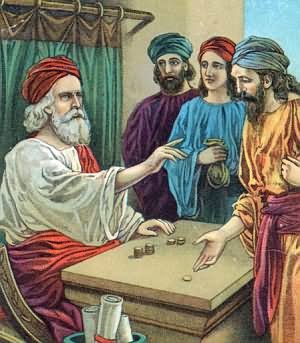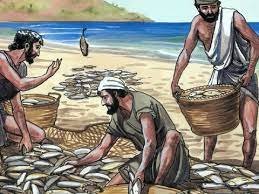After completing a series on the Nature and Development of the Kingdom, we continue the teaching parables, and shall dive into services and rewards parables that Jesus spoke about. He gave us three parables
- The Labourers in the Vineyard (Matt 20: 1 – 16)
- The talents (Matt 25:14-30) or the Pounds (Luke 19:11-27)
- The unprofitable servant (Luke 17:7-10)
The labourers in the vineyard (Matt 20: 1 – 16)
This parable may sound to us as if it is a purely imaginary situation, but that is far from being the case. Apart from the method of payment, the parable describes the kind of thing that frequently happened at that time in Palestine. The grape harvest ripened towards the end of September, and then close on its heels the rains came. If the harvest was not gathered before the rains broke, then it was ruined; and so, to get the harvest in was a race against time. Any worker was welcome, even if he could give only an hour to the work.
The pay was perfectly normal; a denarius or a drachma was the normal day’s wage for a working man.
The men who were standing in the market-place were not street-corner idlers, lazing away their time. The market-place was the equivalent of the labour exchange. In many places in developing nations this type of labour exchange still exists. A man came there first thing in the morning, carrying his tools, and waited until someone hired him. The men who stood in the market-place were waiting for work, and the fact that some of them stood on until even five o’clock in the evening is the proof of how desperately they wanted the work. In many cases no work would mean starving for that day.
The hours in the parable were the normal Jewish hours. The Jewish day began at sunrise, 6 a.m., and the hours were counted from then until 6 p.m. Counting from 6 a.m. therefore, the third hour is 9 a.m., the sixth hour is 12 p.m. afternoon, and the eleventh hour is 5 p.m.
These men were hired labourers; they were the lowest class of workers, and life for them was always desperately precarious. Slaves and servants were regarded as being at least to some extent attached to the family; they were within the group; their fortunes would vary with the fortunes of the family, but they would never be in any imminent danger of starvation in normal times. It was very different with the hired day-labourers. They were not attached to any group; they were entirely at the mercy of chance employment; they were always living on the semi-starvation line. If they were unemployed for one day, the children would go hungry at home, for no man ever saved much out of a day’s labour. With them, to be unemployed for a day was disaster.
This parable gives a vivid picture of the kind of thing which could happen in the market-place of any Jewish village or town any day, when the grape harvest was being rushed in to beat the rains and Jesus’s audience would comprehend this parable as it depicted the reality of that time.
With this background we need to understand this parable. One point the parable is emphasizing is about having a right attitude in service. It is important to note that there were actually two kinds of workers hired that day: those who wanted a contract and agreed to work for the normal wages for a day (Matt 20:2), and those who had no contract and agreed to take whatever the owner thought was right. The first laborers that he hired insisted on a contract (Matt 20:2).
This explains why the householder paid the workers as he did: He wanted those who were hired first (who insisted on a contract) to see how much he paid the workers who were hired later. It was one way the owner could show those workers how really generous he was.
Let’s put ourselves in the place of those workers who were hired first but paid last. They each expected to get a day’s wage, because that was what they agreed. But imagine their surprise when they saw the laborers who were hired last each receiving the same days wage! This meant their own wages should have been twelve times the daily wage! Oh, what a bounty I made today would be going on in my mind!
But the 3 o’clock workers also received a day’s wage—for only three hours of work. The men last in line quickly recalculated their wages: four times the wages for the day’s work. May not be a bounty but not bad for a day.
When the men hired at noon also were paid a day’s wages, this cut the salary of the contract workers considerably, for now they would earn only two times the daily wages. Still receiving double, the amount that was contracted, was not bad.
But the owner gave them just the normal daily wage. Of course, they complained! I would have done a similar thing, if I was in their place. But they had no argument, because they had agreed to work for that amount. They received what they asked for. Had they trusted the goodness of the owner, they would have received far more. But they insisted on a contract.
So, what is the personal lesson I draw from this parable. We should not serve Jesus because we want to receive an expected reward, and we should not insist on knowing what we will get. God is infinitely generous and gracious and will always give us better than we deserve or expect.
Second point is I may do the Father’s work (like the elder son in the parable of the Prodigal son) and yet not do His will from the heart (Eph. 6:6). If I serve Him only for the benefits (temporal and eternal), then I will miss the best blessings He has for me. I must trust Him unreservedly and believe that He will always give what is best.
There is also the danger of pride. “What shall we have?” asked Peter (Matt 19:27). This parable warned him, “How do you know you will have anything?” it reminds me of overconfidence when it comes to the rewards which God will give, for those who are first in their own eyes (and in the eyes of others) may end up last! Likewise, it reminds me not to be discouraged; for those who consider themselves “unprofitable servants” may end up first.
It also reminds be to beware of the danger of watching other workers and measuring myself to them. “Judge nothing before the time,” Paul warns in 1 Cor 4:5. As humans I see the worker and the work, but God sees the heart.
Finally, I must beware of criticizing God and feeling that I have been left out. Had the early morning workers trusted the owner and not asked for an agreement, the owner would have given them much more. He was generous, but they would not trust him. They also did not rejoice that other received more; instead, they were jealous and complained. The goodness of the owner did not lead them to repentance (Rom. 2:4). It revealed the true character of their hearts: They were selfish! If as a servant of God I complain, the only meaning is I have not fully yielded to the master’s will. I need to be happy when someone else is chosen over me. I need to be happy for that person if someone is doing well in life as compared to me.



